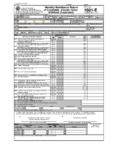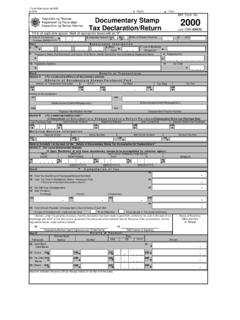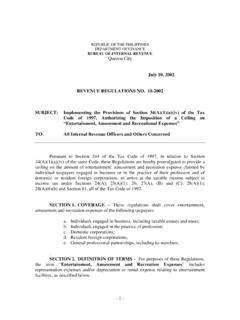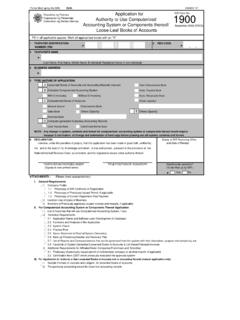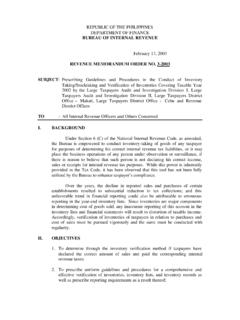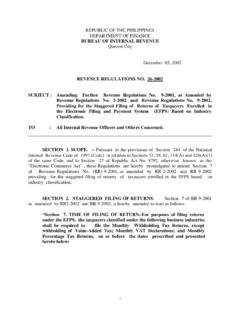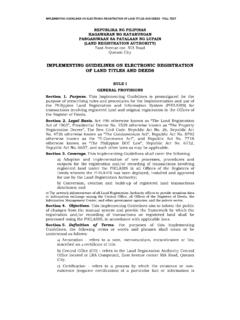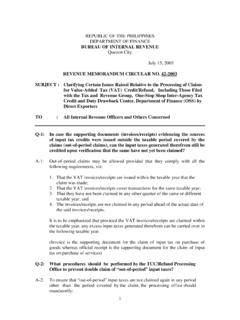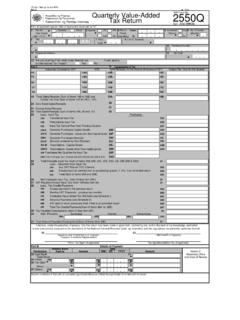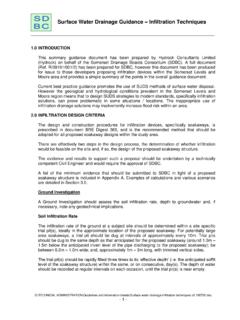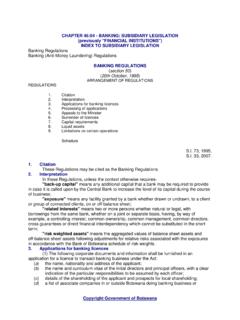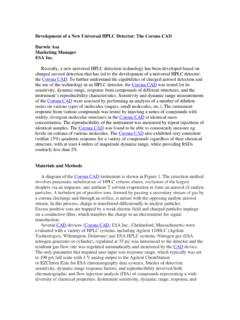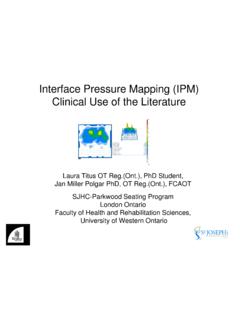Transcription of REVENUE REGULATIONS NO. 2-2003 - LAWPHiL
1 1 REPUBLIC OF THE PHILIPPINESDEPARTMENT OF FINANCEBUREAU OF INTERNAL REVENUEQ uezon City December 16, 2002 REVENUE REGULATIONS NO. 2-2003 SUBJECT :Consolidated REVENUE REGULATIONS on Estate Tax and Donor s TaxIncorporating the Amendments Introduced by Republic Act , the Tax Reform Act of :All Internal REVENUE Officers and Others 1. SCOPE. - Pursuant to Section 244, in relation to Sections 84to 104 of the Tax Code of 1997 (Code), these REGULATIONS are hereby promulgatedfor the purpose of consolidating all the REGULATIONS on estate tax and donor s tax, therebyamending REVENUE REGULATIONS No.
2 17-93 relative to the change in the tax rates ofestate tax and donor s tax pursuant to Republic Act No. 8424, the manner ofclaiming the deductions from the gross estate of the decedent, and for other REGULATIONS shall govern the taxation of the transmission of the decedent s estateand donations made by persons, natural or juridical, whether citizens or aliens, residentsor non-residents. For purposes of these REGULATIONS , the provisions of the Family Code ofthe Philippines ( No.)
3 209) which took effect on August 3, 1988 shall govern theproperty relations between husband and wife whose marriage was celebrated on or aftersuch date. For marriages celebrated prior to the effectivity of the Family Code of thePhilippines, the Civil Code of the Philippines shall govern the property relations betweenhusband and wife in relation to the pertinent provisions of the Family 2. RATES OF ESTATE TAX. - The transfer of the net estate of everydecedent, whether resident or non-resident of the Philippines, as determined inaccordance with the Code, shall be subject to the estate tax.
4 The entire value of the netestate is divided into brackets and each rate is imposed on the corresponding is a table showing the tax on each bracket and the cumulative total tax for theentire net estate, pursuant to the rates provided in the Code. If the Net Estate is: But notThe taxOf the excess Over overshall bePlus over -P 200,000 Exempt--P 200,000 500,00005%P 200,000 500,000 2,000,000P 15,0008% 500,000 2,000,000 5,000,000 135,00011% 2,000,000 5,000,000 10,000,000 465,00015% 5,000,00010,000,000and over 1,215,00020%10,000,0002 SEC.
5 3. THE LAW THAT GOVERNS THE IMPOSITION OF ESTATETAX. It is a well-settled rule that estate taxation is governed by the statute in force atthe time of death of the decedent. The estate tax accrues as of the death of the decedentand the accrual of the tax is distinct from the obligation to pay the same. Upon the deathof the decedent, succession takes place and the right of the State to tax the privilege totransmit the estate vests instantly upon application of the rates herein prescribed and the procedures in determiningthe estate tax due shall apply to estate taxes falling due or have accrued beginningJanuary 1, 1998, the effectivity date of Republic Act No.
6 8424, otherwise known as The Tax Reform Act of 1997 .SEC. 4. COMPOSITION OF THE GROSS ESTATE. The gross estate ofa decedent shall be comprised of the following properties and interest therein at the timeof his death, including revocable transfers and transfers for insufficient consideration,etc.:A) Residents and citizens all properties, real or personal, tangible orintangible, wherever ) Non-resident aliens only properties situated in the Philippines provided,that, with respect to intangible personal property, its inclusion in the grossestate is subject to the rule of reciprocity provided for under Section 104 ofthe 5.
7 VALUATION OF THE GROSS ESTATE. The propertiescomprising the gross estate shall be valued based on their fair market value as of the timeof the property is a real property, the fair market value shall be the fair marketvalue as determined by the Commissioner or the fair market value as shown in theschedule of values fixed by the provincial and city assessors, whichever is higher. Forpurposes of prescribing real property values, the Commissioner is authorized to dividethe Philippines into different zones or areas and shall, upon consultation with competentappraisers, both from the private and public sectors, determine the fair market value ofreal properties located in each zone or the case of shares of stocks, the fair market value shall depend on whether theshares are listed or unlisted in the stock exchanges.
8 Unlisted common shares are valuedbased on their book value while unlisted preferred shares are valued at par value. Indetermining the book value of common shares, appraisal surplus shall not be consideredas well as the value assigned to preferred shares, if there are shares which are listed in the stock exchanges, the fair market value shall bethe arithmetic mean between the highest and lowest quotation at a date nearest the date ofdeath, if none is available on the date of death determine the value of the right to usufruct, use or habitation, as well as that ofannuity.
9 There shall be taken into account the probable life of the beneficiary inaccordance with the latest basic standard mortality table, to be approved by the Secretaryof Finance, upon recommendation of the Insurance 6. COMPUTATION OF THE NET ESTATE OF A DECEDENTWHO IS EITHER A CITIZEN OR RESIDENT OF THE PHILIPPINES. - Thevalue of the net estate of a citizen or resident alien of the Philippines shall be determinedby deducting from the value of the gross estate the following items of deduction :(A) Expenses, losses, indebtedness, and taxes- Such amounts for.
10 (1) Actual funeral expenses (whether paid or unpaid) up to the timeof interment, or an amount equal to five percent (5%) of the gross estate,whichever is lower, but in no case to exceed P200, amount of funeral expenses in excess of the P200,000 threshold, whetherthe same had actually been paid or still payable, shall not be allowed as a deductionunder this Subsection. Neither shall the unpaid portion of the funeral expenses incurredwhich is in excess of the P200,000 threshold be allowed to be claimed as a deductionunder claims against the estate provided under Subsection (C) hereof.

